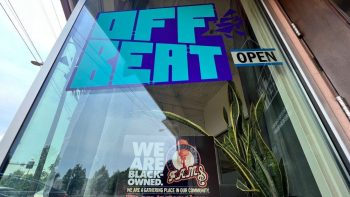Survival for sale
Share Now on:
Survival for sale
SCOTT JAGOW: President Bush arrived on the Gulf Coast today. He spoke Mississippi, on this, the eve of the anniversary of Hurricane Katrina.
[ President Bush: I feel a quiet sense of determination that’s gonna shape the future of Mississippi and so I’ve come back on this anniversary to thank you for your courage and to let you know the federal government stands with you still. ]
The President goes to Louisiana next. In New Orleans, it’s been a long, painful year. The city’s population is half what it was a year ago. Many streets are still littered with debris. Homes and neighborhoods choked by weeds. Not even half the public schools will open this fall. Commentator Marcellus Andrews believes New Orleans is dead, and he blames our immoral economy.
MARCELLUS ANDREWS: Katrina’s destruction of New Orleans is a symbol of our greatest collective sin. Our society ties the right to survival, even down to surviving a natural disaster, to the size of one’s wallet. In the old New Orleans, people with money lived on high ground, while poor people lived way below sea-level.
When the flood waters came, poor people drowned. They didn’t have enough money to leave town.
Katrina claimed so many because the people of Louisiana and the good ole US of A pretended that safety is a private good instead of a public good.
In this country, safety is just one more thing for sale if you have the bucks.
Craziness seduced us into thinking that way, despite the fact that no one of us is rich enough to buy a functioning levee system for a city of half a million people.
Levees, schools, hospitals, police and highways are public goods that we buy together with our taxes because we use them together.
We killed New Orleans when we turned our backs on the fundamental definition of economics as the accumulation of wealth in the service of freedom. A truly moral economy provides freedom from fear as well as freedom from nature’s wrath.
New Orleans died because we forgot about what economists call the free-rider problem: everybody wants public goods but far fewer want to pay for them.
The day we lost New Orleans, our wisest, saddest and most soulful city, our only real Afro-Caribbean city, we were all free riders.
Katrina taught us, again, the most basic economics lesson there is: that nothing is free.
Katrina also taught us that some things, like safety, community, and decency, can only be bought in bulk.
New Orleans is gone. Our cheap ways killed her. We extinguished that languid lady and more than a thousand souls with her, all so we could each pay a little less in taxes.
JAGOW: Marcellus Andrews is author of “The Political Economy of Hope and Fear.”
There’s a lot happening in the world. Through it all, Marketplace is here for you.
You rely on Marketplace to break down the world’s events and tell you how it affects you in a fact-based, approachable way. We rely on your financial support to keep making that possible.
Your donation today powers the independent journalism that you rely on. For just $5/month, you can help sustain Marketplace so we can keep reporting on the things that matter to you.


















